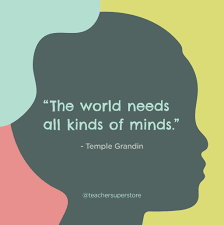
Temple Grandin’s TED Talk shines a light on something many of us have experienced but rarely see discussed on a global platform—how different minds learn, think, and thrive in completely different ways. Her central message is clear: education should adapt to the mind, not the other way around. And honestly, I couldn’t agree more.
She speaks directly to the need for schools to recognize visual thinkers, verbal thinkers, and sensory-based learners. For someone like me, and for kids like mine who don’t always fit the traditional mold, her message hits home. We’ve seen what happens when education becomes a one-size-fits-all approach—it leaves too many brilliant kids bored, overlooked, or misunderstood.
Grandin makes a strong case for including more practical and hands-on learning in schools. I’m talking real-world projects, not just abstract theory. Things like building machines to understand physics, using art to learn patterns, or applying social sciences to community issues. She points out how students with autistic minds, or simply different cognitive strengths, can fall through the cracks if they’re not given the chance to engage in a way that suits their thinking style.
One line that stayed with me: “Show kids interesting stuff.” It sounds simple, but it’s so powerful. She reminds us that some children are wired for social engagement, while others are deeply cognitive or sensory-driven. That means our lessons, tools, and expectations should shift to meet them where they are. Visual learners? Use diagrams, videos, and interactive simulations. Verbal learners? Encourage discussion and storytelling. And for those who learn by doing, create space for building, experimenting, and exploring.
She also credits her science teachers and the hands-on opportunities she had growing up—internships, mentorships, building things from scratch. That’s something I truly resonate with. I’ve learned firsthand how much mentorship shapes real learning, and how much experience outside the classroom matters. Her story is a reminder that education shouldn’t just be about academics; it should be about preparing students to thrive in life.
One of her most practical suggestions was using a child’s fixation as a bridge to deeper learning. I love that idea. If a child is obsessed with trains, use that to teach physics, history, geography, or even design. If they love animals, build a curriculum around biology, empathy, and ecosystems. She’s not just talking about accommodating students—she’s talking about unlocking their potential.
For schools, that might look like partnerships with local industries or inviting guest speakers from various fields. For me, as a homeschooler, it means building a curriculum that is flexible, real, and deeply personal. I’ve already seen the difference it makes when I allow my children to explore engineering, robotics, and creative arts through self-guided projects.
Temple Grandin challenges us to be the kind of teacher or parent who sees the potential in every kind of mind. To be the person who sees a spark and fans it into a flame. Whether that means offering essay options or letting students demonstrate knowledge through a model or video, the goal is the same: let them shine in their own way.
If we want to truly prepare the next generation for success—not just academically, but emotionally, socially, and professionally—we have to start by recognizing that there’s no single path to brilliance. That’s what Grandin’s talk is really about. And that’s why I’m so glad I’m homeschooling my kids. Because I can start building that kind of education now, at home.
Watch the full TED Talk here: The World Needs All Kinds of Minds – Temple Grandin
Recent Comments
Recent Posts
-

There Is No Basis for Pride
5 Nov, 2025 -

Love is Passionate
20 Oct, 2025 -

-

The Devil has a Foothold When You Do Not Love
14 Oct, 2025



